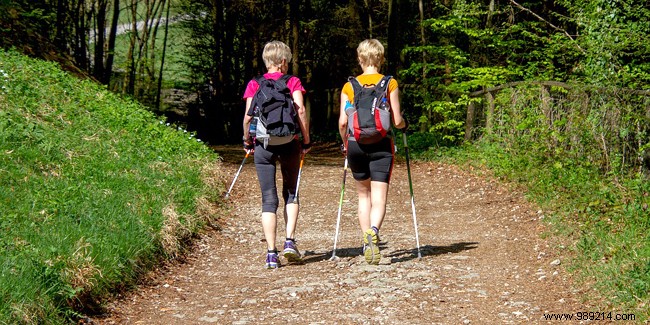
Regular walking is known to reduce the risk of cancer and diabetes, to limit strokes and to reduce stress. Nordic walking, more enduring, and above all faster than classic walking but accessible to all, helps to stay in good shape. It is believed to have many health benefits
Nordic walking is an outdoor sport in its own right, originating in Finland. It is practiced by people of all ages and in varied physical condition, each at their own pace. Nordic walking is practiced with poles specially designed for this sport, which look like ski poles, and which help to adopt good postures. These make the arms move at the same time as the legs, and help to work on the balance of the body. It is the sticks that give rhythm to the movement of the legs. The arm is always synchronized with the opposite leg. While walking, the poles face backwards and help the walker propel themselves forward to increase their speed. This walk, alternating dynamic and slower, allows you to easily cover long distances without too much fatigue, even if the ground is not flat. Poles help to move forward safely.
The straight position adopted by the Nordic walker thanks to his poles, balances his shoulders and prevents him from leaning and bending forward and avoids back pain caused by a sporting activity. This sport is therefore particularly recommended for people who have difficulty walking and keeping their balance, particularly because of back problems.
Like all sports, Nordic walking requires a good warm-up, as well as good stretching at the end of each session.
This sport can be practiced in the city, in the countryside or in the mountains.
Nordic walking has the reputation of having benefits for the body, the heart and the mind. It is a complete sport accessible to all which allows you to stay in shape.
Nordic walking, which is practiced by alternating dynamic phases and slower phases, is in this sense an endurance sport. However, as we know, all physical endurance activities help to work on the cardiac capacities and to improve them. Nordic walking, practiced regularly, allows you to regain your breath because the use of poles allows you to open your rib cage and increase your breathing capacity.
Nordic walking is a complete sport that requires 80% of the muscles of the body. Thanks to the sticks, the movements are amplified and contribute to strengthening the shoulders and arms, as well as the abs, the muscles of the thighs and the glutes. At the same time, it helps to make the body more flexible, especially the knee and hip joints which, especially with age, tend to "seize up". Nordic walking forces you to walk straight and builds muscle from the bottom up, including the neck.
Whether you have weight to lose or not, Nordic walking is for you. It is indeed faster than conventional walking thanks to the poles and therefore involves greater energy expenditure, 40% more than traditional walking. By practicing Nordic walking, you burn more calories. An endurance sport, Nordic walking also eliminates fat stored in the body.
Walking facilitates venous return. The more sustained pace of Nordic walking can accentuate this benefit. This walk activates blood circulation, slows down the appearance of varicose veins and reduces the risk of hypertension.
Studies have shown that Nordic walking, practiced 20 minutes a day and 5 days a week, helps to develop, strengthen and fortify bone mass. A sport to recommend therefore to people suffering from osteoporosis or diseases affecting the bones.
As an outdoor sport, Nordic walking allows you to enjoy the countryside or quiet spaces and relax, far from everyday stress. It is also an opportunity to walk in the company of friends and break a certain isolation.
If Nordic walking can be practiced by everyone, be careful however to adapt it if you suffer from arthritis, osteoarthritis, tendonitis or major rheumatic diseases.